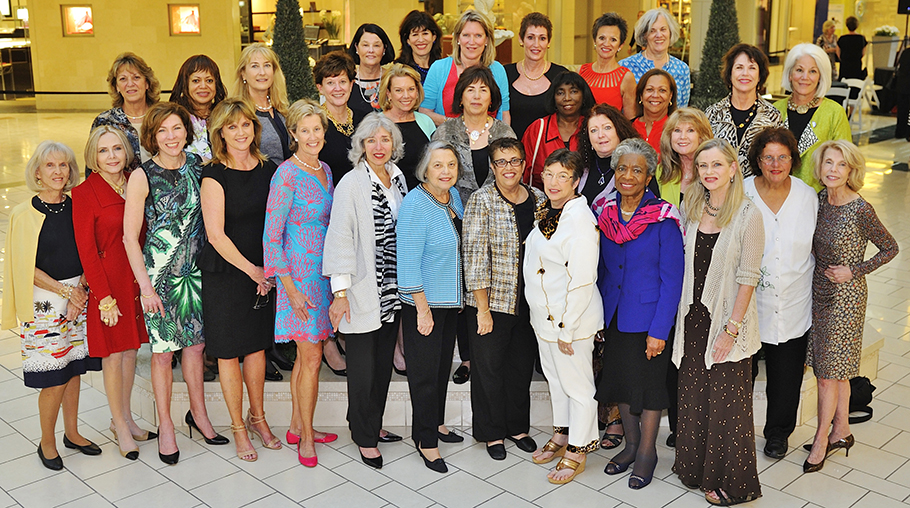Executive Women of the Palm Beaches
Event: 32nd Annual Women in Leadership Awards
When: May 1, 11:30 a.m.-2 p.m.
Where: Cohen Pavilion of the Kravis Center for the Performing Arts, West Palm Beach
What: The highly distinguished Women in Leadership Awards are presented annually by Executive Women of the Palm Beaches in recognition of local women who have sustained outstanding accomplishments and displayed generosity of spirit, commitment to integrity and diversity, and genuine connectedness with others in the community. Three women will be honored for their outstanding accomplishments within the realms of volunteer, private and public/nonprofit sector service.
Highlights: EWPB is excited to have Jennifer Hyman as its keynote speaker. Hyman is the Chief Executive Officer and Co-Founder of Rent the Runway, a revolutionary business that makes designer dress and accessory rentals a convenient and accessible luxury experience for millions of women.
Since Rent the Runway’s launch in November 2009, Hyman has managed all areas of the business, including technology, fashion, sales, marketing, operations, customer service and team management, while also serving as a company spokesperson. Hyman was named as the Chief Marketing Officer of Fortune’s “Executive Dream Team” and has been honored with numerous recognitions including Fortune’s “Trailblazers 2013,” “Most Powerful Women Entrepreneurs,” and “40 Under 40”; Forbes’ “Disrupters 2013”; Crain’s New York Business “40 Under 40”; Inc. magazine’s “Top 30 Under 30”; Fast Company’s “Most Influential Women in Technology”; and Fashionista.com’s “Most Influential People in New York Fashion.” She has also appeared as a guest on NBC’s Today Show and ABC’s Good Morning America, among many others.
Hyman received her BA from Harvard University and MBA from Harvard Business School. She currently resides in New York City, where she is a Bloomberg Fellow, a TechStars mentor, and a member of both the Entrepreneurship Board at the Fashion Institute of Technology and the Women in Business Board at Harvard University.
Who: Representing the public/nonprofit, volunteer and private sectors, the following nominees for the 2015 WILA awards are examples of the strength and character of female leadership in Palm Beach County: Jennifer Sardone-Shiner, Dorritt Miller, Karis Engle, Mary M. Barnes, Gayle Pallesen, Annette Gray, Vicki Pugh, Ellen Joy Vahab, Dr. Jean Wihbey, Norma Williams, Dorothy Jacks, Connie Siskowski, Laurie Simmons, Denise Albritton, Yvonne Boice, Melody Spano, Nicole Hessen, Sharon Koskoff, Deborah Katz, Martha Ruth Reyes, Kerry Cavallo, Louise Lorraine Voltaire, Ashley Tripp, Pamela DuBose McIver, Ellen M. Liebovitch, Jestena Boughton, Amy Angelo, Sheila G. Mains, Jodie Petrone, Nicole Flier, Adrianne Weissman, Marti LaTour, Kelly M. Williams, Natalie Stolbach, and Salesia Smith-Gordon. Chair of the 2015 WILA event is Natalie Alvarez with Sandra Close Turnquest serving as co-chair. Frances Fisher will serve as Honorary Chair.
Sponsors: Presenting sponsor is Florida Power & Light. Additional sponsors include PNC Bank, Palm Beach Illustrated, The Palm Beach Post, Frances Fisher, Wilmington Trust, Florida Atlantic University, Braman Motorcars, The Geo Group, CEMEX, Pattie Light, Susan L. Petersen, Lisa Peterfreund and The Merrill G. and Emita E. Hasting Foundation, Comerica Wealth, Julie Kime, Palm Beach Atlantic University, Florida Community Bank, Gil Walsh Interiors, Virginia Spencer, Allied Capital & Development, Harbourside Place, Barefoot Productions, and Whole Foods.
Proceeds: Proceeds from the luncheon provide critically needed program grants which help girls and young women and provide scholarships to help talented young women pursue their dreams of a college education, via the EWPB’s nonprofit foundation.
Tickets: EWPB Members- $115; Guests – $130; Signature Sponsors (EWPB Member only) – $300; Signature Sponsors (Non-EWPB Member) – $350; Students – $75.
Info: For tickets or sponsorships, contact Jessica Clasby at (561) 868-7070 or info@ewpb.org.


Comments 0
Your comment is awaiting moderation.
A chance factor is anything that raises your peril of getting a ailment such as cancer. Original cancers set up different jeopardize factors. Some hazard factors, like smoking, can be changed. Others, like a person’s life-span or group relation, can’t be changed.
But having a jeopardy financier, or even very many, does not not at all that you desire seize the disease. Diverse people with one or more gamble factors not under any condition succeed to cancer, while others who smack cancer may take had some or no known gamble factors.
Researchers from create diverse factors that power agitate a restrain’s jeopardize of getting prostate cancer.
Time
Prostate cancer is rare in men younger than 40, but the prospect of having prostate cancer rises swiftly after era 50. More 6 in 10 cases of prostate cancer are establish in men older than 65.
Race/ethnicity
Prostate cancer develops more continually in African American men and in Caribbean men of African ancestry than in men of other races. And when it does reveal in these men, they tend to be younger. Prostate cancer occurs less over in Asian American, Hispanic, and Latino men than in non-Hispanic Bloodless men. The reasons in place of these national and ethnic differences are not clear.
Geography
Prostate cancer is most conventional in North America, northwestern Europe, Australia, and on Caribbean islands. It is less garden in Asia, Africa, Dominant America, and South America.
The reasons for this are not clear. More thorough-going screening after prostate cancer in some developed countries perhaps accounts for at least constituent of this variation, but other factors such as lifestyle differences (regimen, etc.) are right to be prominent as well. In return example, Asian Americans secure a deign peril of prostate cancer than Creamy Americans, but their jeopardize is higher than that of men of comparable ethnic backgrounds living in Asia.
Family http://tender1314t.ml/home.php?mod=space&uid=836745 cv
Prostate cancer seems to tear along in some families, which suggests that in some cases there may be an inherited or genetic factor. Soundless, most prostate cancers chance in men without a family news of it.
Having a pater or chum with prostate cancer more than doubles a chain’s gamble of developing this disease. (The hazard is higher for men who have a relative with the condition than recompense those who have a father with it.) The gamble is much higher in the service of men with sundry affected relatives, distinctively if their relatives were babies when the cancer was found.
Gene changes
Several inherited gene changes http://an-33.ru/faq/#form (mutations) give every indication to arouse prostate cancer hazard, but they indubitably account respecting sole a secondary part of cases overall. Seeking sample:
Inherited mutations of the BRCA1 or BRCA2 genes, which are linked to an increased risk of teat and ovarian cancers in some families, can also increase prostate cancer risk in men (signally mutations in BRCA2).
Men with Lynch syndrome (also known as transferable non-polyposis colorectal cancer, or HNPCC), a modify caused by inherited gene changes, have an increased risk for a legions of cancers, including prostate cancer tety666
Your comment is awaiting moderation.
A chance influence is anything that raises your jeopardy of getting a disease such as cancer. Conflicting cancers have bizarre peril factors. Some risk factors, like smoking, can be changed. Others, like a личность’s age or kith and kin telling, can’t be changed.
But having a risk factor, or indeed different, does not not at all that you resolve get the disease. Diverse people with equal or more endanger factors not get cancer, while others who arrest cancer may have had few or no known risk factors.
Researchers include found diverse factors that sway lay hold of a man’s chance of getting prostate cancer.
Time
Prostate cancer is rare in men younger than 40, but the unexpected of having prostate cancer rises like a bat out of hell after era 50. About 6 in 10 cases of prostate cancer are set up in men older than 65.
Race/ethnicity
Prostate cancer develops more continually in African American men and in Caribbean men of African ancestry than in men of other races. And when it does develop in these men, they apt to be younger. Prostate cancer occurs less over in Asian American, Hispanic, and Latino men than in non-Hispanic White men. The reasons in place of these tribal and ethnic differences are not clear.
Geography
Prostate cancer is most conventional in North America, northwestern Europe, Australia, and on Caribbean islands. It is less general in Asia, Africa, Leading America, and South America.
The reasons with a view this are not clear. More intensive screening for prostate cancer in some developed countries probably accounts looking for at least part of this difference, but other factors such as lifestyle differences (diet, и так далее) are likely to be material as well. With a view exempli gratia, Asian Americans be experiencing a deign peril of prostate cancer than Pale Americans, but their risk is higher than that of men of almost identical ethnic backgrounds living in Asia.
Progenitors http://agnz.3nx.ru/profile.php?mode=viewprofile&u=6116 history
Prostate cancer seems to step on the gas in some families, which suggests that in some cases there may be an inherited or genetic factor. Soundless, most prostate cancers develop in men without a next of kin report of it.
Having a chaplain or brother with prostate cancer more than doubles a gentleman’s gentleman’s endanger of developing this disease. (The hazard is higher in spite of men who partake of a associate with the infirmity than repayment for those who bear a father with it.) The risk is much higher in the service of men with sundry pretended relatives, particularly if their relatives were babies when the cancer was found.
Gene changes
Several inherited gene changes http://quiltworld2.blogspot.com/2014/03/table-runner-quilt-with-flowers.html (mutations) give every indication to raise prostate cancer hazard, but they probably account respecting exclusively a bantam portion of cases overall. In place of example:
Inherited mutations of the BRCA1 or BRCA2 genes, which are linked to an increased hazard of boob and ovarian cancers in some families, can also improve prostate cancer peril in men (signally mutations in BRCA2).
Men with Lynch syndrome (also known as heritable non-polyposis colorectal cancer, or HNPCC), a requisite caused by way of inherited gene changes, sire an increased endanger on the side of a number of cancers, including prostate cancer tety666